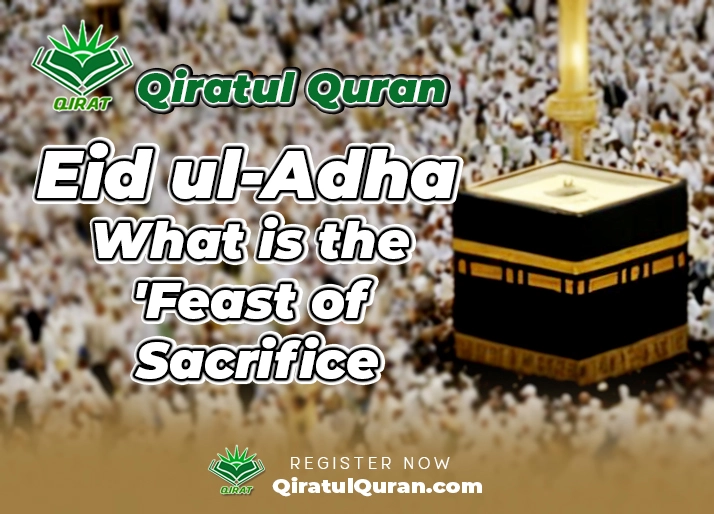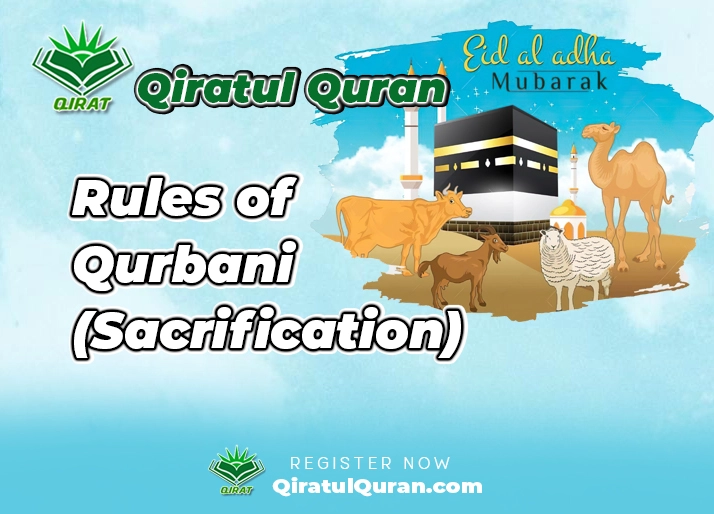Eid ul-Adha, also known as the ‘Feast of Sacrifice’, is one of the most important religious holidays for Muslims around the world. Observed on the 10th day of Dhu al-Hijjah, the last month of the Islamic calendar, Eid ul-Adha commemorates the willingness of the prophet Ibrahim (Abraham) to sacrifice his son Ishmael as an act of obedience to God. However, before Ibrahim could sacrifice his son, God provided a ram to be sacrificed instead. To commemorate this test of faith, Muslims celebrate Eid ul-Adha.

The Story Behind Eid ul-Adha
The story behind Eid ul-Adha originates from the Quran and is also shared by the Jewish and Christian faiths. According to Islamic tradition, the valley of Mecca was an uninhabited place during the time of the prophet Ibrahim. God commanded Ibrahim to bring his Egyptian wife Hajar and their infant son Ismail to Arabia and leave them there.
Ibrahim followed God’s orders, though he was distressed at abandoning his family in such a desolate landscape. But he had faith in God’s plan. Hajar was also desperate, as she and her son struggled to survive. She ran back and forth between the hills of Safa and Marwah seven times, searching for water.
Finally, God showed mercy to Hajar and revealed to her the Zamzam well, from which she was able to quench her thirst and nurse her son. When Ismail was in his early teens, God spoke to Ibrahim and commanded him to sacrifice his beloved son.
Ibrahim shared this haunting vision with Ismail, who bravely encouraged his father to follow God’s orders. As Ibrahim prepared to sacrifice his son as an act of obedience and faith in God, God stayed his hand and revealed that the vision had been a test of his faith. Allah then provided a lamb to be sacrificed instead.
To commemorate Ibrahim’s willingness to sacrifice his son and their shared faith in the Almighty, Muslims around the world celebrate Eid ul-Adha.
Eid ul-Adha Rituals and Traditions
Eid ul-Adha is celebrated with both religious and cultural traditions. Here are some of the most important rituals associated with this major Islamic holiday:
Prayers and Gatherings
On the first morning of Eid ul-Adha, Muslims wake up early and perform Eid prayers, followed by additional takbir prayers. Often the prayers take place in large congregations at a mosque or outdoor prayer ground. Imams deliver sermons, discussing the virtues of the holy day and the story of Ibrahim and Ismail.
After the prayers, families and friends gather together to celebrate with food, sweets, and gift exchanges. They share joyful expressions of “Eid Mubarak,” meaning “Blessed Eid,” to wish each other well on the holy occasion.
Charity and Sacrifice
Eid ul-Adha commemorates Ibrahim’s devotion to God, so charity and sacrifices are important parts of the holiday. Muslims who have the means are obligated to donate money or food to those less fortunate.
The holiday also involves the sacrifice of an animal, usually a sheep, goat, or cow. This represents the sacrifice in place of Ismail commemorated during Eid ul-Adha. A portion of the meat is consumed by the family while the remainder is donated to the poor and needy.
Pilgrimage to Mecca
Eid ul-Adha coincides with the final days of the annual Hajj pilgrimage to Mecca in Saudi Arabia. All able-bodied Muslims are required to perform the Hajj once in their lifetime during the designated days on the Islamic calendar.
The Hajj rituals commemorate the sacrifices of Ibrahim, Hajar, and Ismail. The pilgrimage concludes on Eid ul-Adha as pilgrims complete their journey and celebrate among fellow Muslims.
Celebrating Eid Around the World
Eid ul-Adha is celebrated among Muslim communities globally but incorporates diverse cultural traditions:
South Asia
In India, Pakistan, and Bangladesh, Eid ul-Adha is called Bakra-Eid, stemming from the Urdu word Bakri for ‘goat’ since goats are commonly sacrificed. Festive desserts like sheer khurma, a vermicelli pudding with milk, and pheni, a sweet rice dish, are enjoyed. New clothes are worn, families gather for elaborate meals, and children receive gifts and cash.
Middle East
In Arab countries like Egypt, Lebanon, and Syria, families wake up early on Eid ul-Adha to offer prayers and gather for a hearty breakfast. Sweets like maamoul (filled cookies) and kaak bi loz (almond bracelets) are served. Children receive new clothes and money from elders. The meat from the sacrificed animals is shared with friends, relatives, and the poor.
Malaysia and Indonesia
Eid ul-Adha is known as Hari Raya Haji and Qurban in Malaysia and Indonesia. Prayers are held at mosques in the morning, followed by elaborate meals attended by extended family. Festive dishes like ketupat (rice dumplings), rendang (beef curry), and sayur lodeh (vegetable stew) are served. New traditional clothes called baju Melayu are worn.
West Africa
In Senegal, Ivory Coast, and Gambia, Eid ul-Adha is called Tobaski. Sheep are highly valued, and the best animals are sacrificed. Senegalese exchange the greeting “ndek ban Tobaski” meaning “happy Tobaski.” New clothing called grand boubou is worn, and communities gather for elaborate meals of thieboudienne (fish and rice) and mafe (beef stew).
United States
American Muslims attend congregational morning prayers and community festivals. Mosques and cultural centers host carnivals and events. Families get together for meals, exchange gifts, and donate to charity. Kids dress up in new clothes and receive money from elders. Significant populations in places like Michigan, Illinois, and New York celebrate on a large scale.
So while traditions vary, Eid ul-Adha is commemorated by all Muslims through special prayers, charity, gift exchanges, feasts, and time with loved ones. The holiday honors the shared sacrifice and faith of Ibrahim and Ismail.
The Significance of Eid ul-Adha
Eid ul-Adha is a major religious and cultural event for Muslims worldwide. Here are some key reasons why this holiday holds such significance:
Displaying Submission to God
By commemorating Ibrahim’s willingness to surrender completely to God’s will, Eid ul-Adha signifies the importance of devotion and submission to the Almighty in Islam. Muslims honor Ibrahim’s faith and use the holiday as motivation to strengthen their own connection with God.
Embodying the Spirit of Sacrifice
The sacrifices made during Eid ul-Adha represent the sacrifice asked of Ibrahim and the ransom provided by God. Muslims embrace the virtues of sacrifice and generosity by sacrificing animals and donating portions of the meat as charity on this holiday.
Strengthening the Community
Eid prayers, festivals, family gatherings, and charitable acts allow Muslims to connect with their faith community. Mosques and neighborhoods come alive on Eid ul-Adha as Muslims celebrate together after intense fasting and worship during Ramadan. A sense of community is reinforced.
Honoring the Pilgrims
Eid ul-Adha coincides with the Hajj, honoring those undertaking the sacred pilgrimage to Mecca that year. Muslims worldwide express support for the millions of pilgrims taking part in the holy rituals. Completing Hajj and celebrating Eid with fellow pilgrims is seen as a great blessing.
Promoting Equality and Unity
Eid ul-Adha serves as a great equalizer as all Muslims, regardless of wealth, come together in mosques and celebration grounds to worship side-by-side. Everyone dresses in their best new clothes as a way to emphasize the sense of community rather than class.
For these reasons, Eid ul-Adha holds a special place of reverence and joy for Muslims, commemorating divine mercy, devotion, and community. The holiday represents the pinnacle of Islamic faith and practice.
Conclusion
Eid ul-Adha is the Feast of Sacrifice, commemorating the prophet Ibrahim’s willingness to surrender to Allah’s command to sacrifice his son Ismail. This test of faith is memorialized by Muslims around the world through Eid prayers, sacrifices of animals, distribution of meat to the poor, social gatherings, and other traditions. Occurring at the conclusion of Hajj, it is a time for communal joy and reflection on the virtues of devotion and charity. Eid ul-Adha strengthens bonds within Muslim communities worldwide as they follow the footsteps of Ibrahim and renew their commitment to God. The holiday underscores core Islamic principles of compassion, unity, and submitting one’s will to the Almighty.
Note: To take Online Quran Classes Look into our More Branded Quran Courses.
Qiratul Quran Branded Quran Courses
- Noorani Qaida Course
- Intensive Quran Course
- Quran Memorization Course
- Maqamat Course
- Arabic Grammar Course
Related Courses
- Intensive Hifz Course
- Intensive Arabic Course
- Egyptian Arabic Language Course
- Quran Hifz for Kids
- Quran hifz for Ladies




